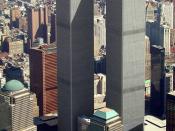March/April 1998
Vol. 54, No. 2
Terrorism's New Breed
Are today's terrorists more likely to use chemical and biological weapons?
by Jose Vegar
It could be any American city: New York, Philadelphia, Denver, Washington, D.C. A sunny spring day is suddenly punctured by the blare of sirens, as police and firefighters race to a shopping mall, or a government building, or a train or bus station. Once on the scene, emergency personnel in protective suits hurry inside where people are sprawled on the floor, overcome by an unknown chemical agent. Outside, paramedics erect a mobile decontamination unit.
This might sound like a scene out of a summer disaster movie, but it is the increasingly common sight of a U.S. city preparing for a terrorist attack involving chemical or biological weapons. In 1997 alone, more than 20 cities staged such mock attacks in an effort to coordinate the responses of local and federal emergency services workers.
While the "victims" are usually volunteers or Boy Scout troops fulfilling their community service requirements, the drills provide essential training for local emergency services workers, who will likely be the first on the scene in the event of a real attack. Such exercises are part of the Defense Department's Domestic Preparedness Program, which will spend more than $40 million to train and evaluate emergency personnel in 120 U.S. cities.
In recent years, the fear of terrorists using chemical or biological weapons has moved from thriller-novel fantasy to front-page news. Chemical and biological weapons are easier to acquire than nuclear devices: relatively little scientific training is required for their production, and they can be concocted in rather simple laboratories using readily available materials. And at the same time that chemical and biological weapons have become easier to obtain, many in the anti-terrorism field believe there...


